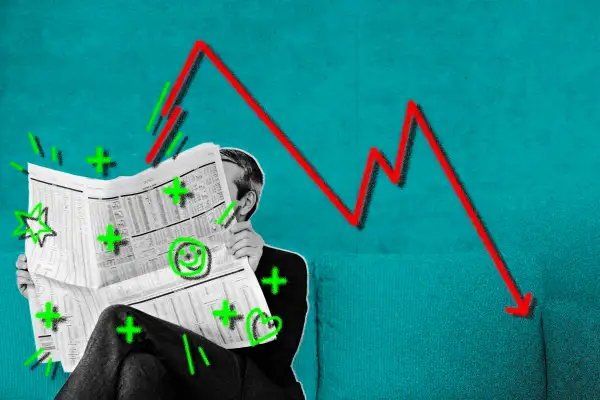Why Good Economic News Could Be Bad for the Stock Market Right Now
Money is not a client of any investment adviser featured on this page. The information provided on this page is for educational purposes only and is not intended as investment advice. Money does not offer advisory services.

Good news makes stock prices go up, and bad news makes stock prices go down, right?
Not always.
There are a lot of different factors that can impact stocks. When a company reports positive earnings results or exciting news like a new partnership or product, that business's stock price is likely to jump. And legislation that could impact a certain sector positively can give companies in those industries a bump, like we saw with the Inflation Reduction Act and energy companies.
But recently, some news that seems positive for the economy — like a booming jobs market and strong consumer spending — could actually be hurting the stock market.
How could this be? It all comes down to something you've probably heard a lot about recently: inflation. More specifically, it comes down to what the Federal Reserve is doing about those high prices you're experiencing just about everywhere.
Why good news is bad for stocks right now
The Federal Reserve has a tough task on its hands. It's been hiking interest rates for months — most recently by another three-quarters of a percentage point — in an attempt to curb inflation while not tipping the economy into a recession.
Higher interest rates increase borrowing costs, making it more difficult for businesses and consumers to spend money and thus cooling the economy and bringing down spiraling prices. But interest rate hikes also tend to bring down the price of financial assets, like stocks, bonds and cryptocurrency.
The "problem" is that the economy is doing well in many ways, despite the Fed's interest rate increases. And a lot of good news for the economy stirs fears about the central bank continuing its aggressive rate hikes — a move that will likely continue to hurt stocks.
"Reports showing strong consumer spending, healthy industrial activity, better housing numbers, or solid job figures only raise fears that the Fed will be forced to lift interest rates higher for longer," Jim Paulsen, chief investment strategist at the Leuthold Group, wrote in a research note Tuesday. "It’s a tough environment for investors."
Evidence of a healthy economy is typically a good thing for investors, he continues. But until the Fed shifts its policy and concern about inflation slows, "news that is ordinarily good will be 'bad.'"
The opposite is true as well. For example, stocks popped in the summer after reports that U.S. gross domestic product — which is used to measure the country’s economic output — shrank in the second quarter following a contraction in the first. Many experts said that investors had already priced in much of the poor economic news and were hopeful that it meant the Fed would be able to ease up on the rate hikes.
The (actually) good economic news for investors
Of course, not all good economic news is bad for stocks. Paulsen points to several positive stats that can be considered genuinely good news for investors hoping for some relief from the bear market.
For example, confidence among consumers, small businesses and CEOs has risen in recent months, he says. While that could typically frighten the Fed into raising rates more aggressively, the most recent confidence boost was tied to a decline in the inflation rate, according to Paulsen.
"In our view, an upswing in confidence is a sign that we are winning the war against inflation," he writes. He predicts that as inflation lessens, "confidence will steadily improve and help the U.S. avoid any potential recession (or at least significantly buffer its impact) rather than exacerbate inflation."
Another piece of truly "good news" is that U.S. trade is improving.
"Trade improvement typically reflects sluggish economic activity," Paulsen writes. "Consequently, trade improvement tends to simultaneously signal less inflationary force (i.e., slower U.S. economic growth) while also providing a buffer to any economic contraction."
All eyes are on upcoming economic data and the Federal Reserve. But remember that there are tons of factors that impact the stock market. Among the other considerations investors should take into account: News that's bad on the surface may not be all that bad — and vice versa.
More from Money:
Is a Bull Market Coming for Stocks? Experts Say to Watch for These 5 Signs
Will Stocks Rally to Close out 2022? Here's What History Tells Us

